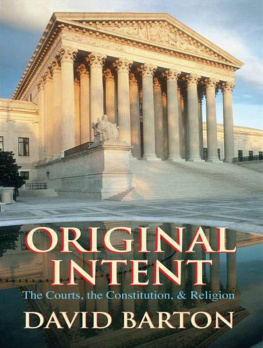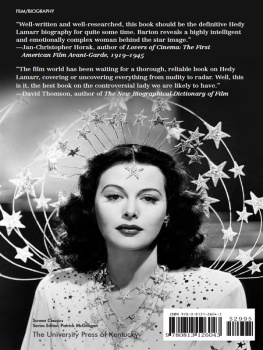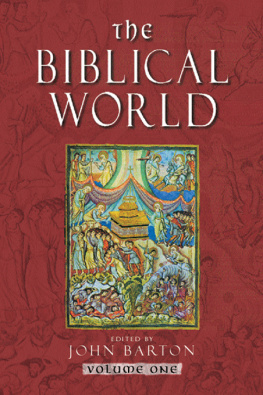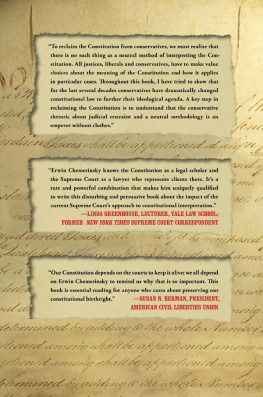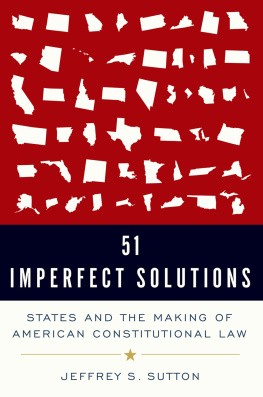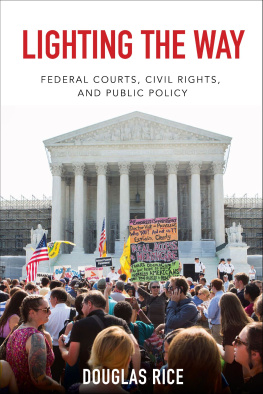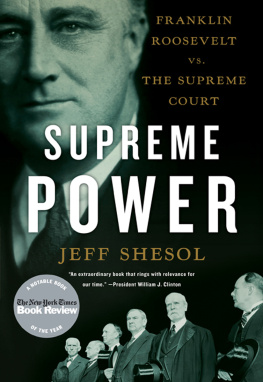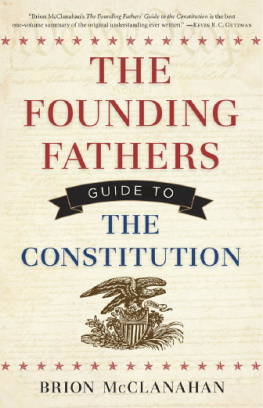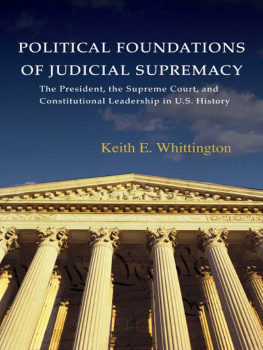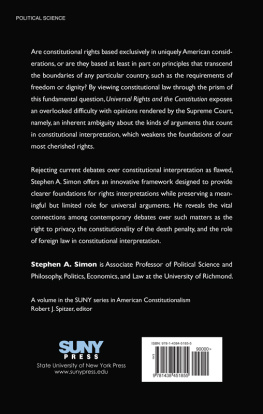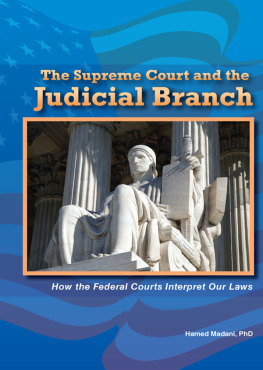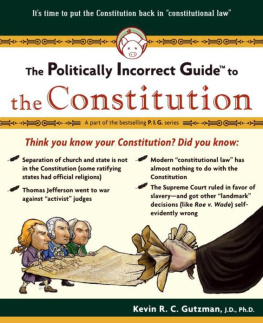Original Intent: The Courts, the Constitution, and Religion
Copyright 1996, 2000, 2008, 2011 by David Barton
5th Edition, 2nd Printing, February 2011
All Rights Reserved. No part of this book may be reproduced in any manner whatsoever without written permission of the publisher, except in the case of brief quotations in articles and reviews.
Additional materials available from:
WallBuilders
P.O. Box 397
Aledo, TX 76008
(817) 441-6044
www.wallbuilders.com
Cover Design:
Jeremiah Pent
Lincoln-Jackson
838 Walden Dr.
Franklin, TN 37064
Library of Congress Cataloging-in-Publication Data
342.73
Barton, David.
Original intent: the courts, the constitution, and religion.
Aledo, TX: WallBuilder Press
561 p; 21 cm.
Endnotes, list of cases cited, bibliography, and index included.
ISBN-13: 978-1-932225-26-6 (Paperback edition)
ISBN-13: 978-0-925279-75-0 (Hardback edition)
1. United States Constitutional history 2. Church and state United States 3. United States Constitutional law Interpretation and construction I. Title
Printed in the United States of America
Table of Contents
Our Constitution operates on long-standing principles which were recognized and incorporated into our government over two hundred years ago; each constitutional provision reflects a specific philosophy implemented to avoid a specific problem. Therefore, grasping the purpose for any clause of the Constitution is possible only through a proper historical understanding of the debates and the conclusions reached two hundred years ago.
For example, when adjudging the permissible in the realm of public religious expressions, courts revert to what they perceive to be the intent of those who, in 1789, drafted the religion clauses of the Constitution. Likewise, the perception of historical intent similarly affects the debates on gun control and the Second Amendment, States Rights and the Tenth Amendment, abortion and the Ninth and Fourteenth Amendments, flag-burning and the First Amendment; etc. Therefore, if our understanding of historical facts and constitutional intent becomes confused or mistaken, the resulting policies may be not only ill-founded but may actually create the very abuses that the Founders originally intended to avoid.
Because the portrayal of history so affects current policy, some groups have found it advantageous to their political agenda to distort historical facts intentionally. Those particularly adept at this are termed revisionists. (A thorough discussion of revisionism is presented in Chapter 16.) Not all dissemination of incorrect information, however, is deliberately intended to misinform; in many cases, it is the result of individuals innocently repeating what others have mistakenly reported.
In fact, there is an unhealthy tendency in many current books on the Founders a tendency confirmed in their concluding bibliographies to cite predominately contemporary authorities speaking about the Founders rather than citing the Founders own words. Such evidence is termed hearsay and would never stand up in a court of law. Original Intent, however, has pursued the practice of best evidence: it lets the Founders speak for themselves in accordance with the legal rules of evidence.
Furthermore, not only does Original Intent document the original intent on a number of constitutional issues debated today, it also documents how this essential information is often ignored under todays standard of political correctness. Indicative of this deletion of information, the following questions are raised and answered in this book.
- Although there were fifty-five Founders who drafted the Constitution, and ninety more who drafted the Bill of Rights, why does the current Court invoke only Thomas Jefferson and James Madison as its spokesmen? Are there no constitutional authorities among the other one-hundred-forty-plus who framed those documents? Or, is it possible that their words would directly contradict the current Courts conclusions?
- Since Jefferson has over sixty volumes of written works and Madison has over twenty, why does the Court continually invoke only one or two select sentences from these exhaustive works? Is it perhaps that the rest of the statements made by Madison and Jefferson reveal the Courts intentional misportrayal of their intent?
- Since several signers of the Constitution were also Justices on the U. S. Supreme Court, why does the current Court avoid citing the declarations of those Justices on todays issues? Is it perhaps that the concise rulings of those who so clearly understood constitutional intent would contradict and thus embarrass the Court for its current positions?
Not only are these questions answered in this book but the answers are established from the expansive writings of scores of Founders, not just inferred by narrow references from only a select few.
As more and more of the primary-source information documenting the views of the Founders has been publicized, it clearly has contradicted what the courts and some scholars have claimed. In fact, those individuals, to protect their own views and to diffuse growing criticism against them, have characterized the irrefutable historical facts which confront them as nothing more than revisionism. Ironically, it is quite the contrary; for by reverting to primary-source historical documents, the true historical and legal revisionism which has occurred over recent generations is now being systematically exposed and rebutted.
Original Intent will provide hundreds of the Founders direct declarations on many of the constitutional issues which America continues to face today. Their words, their conclusions, and especially their intent is clear; their wisdom is still applicable for today. Since these clear views may be new to many Americans, this work has been heavily footnoted, and the reader is strongly encouraged to investigate the sources cited in order to confirm the accuracy of the conclusions which have been reached.
The editors have utilized several helpful procedures and included seven beneficial appendices (discussed below) to augment the usefulness of this book.
1. Notes on Spelling
Prior to 1800, there was virtually no uniform standard for spelling in America. Consequently, the same word could be spelled several ways. (In fact, one colonial Governor allegedly spelled his own name six different ways! ) Notice the spellings (words misspelled by todays standards are underlined) appearing in the Pilgrims Mayflower Compact of 1620:
We whose names are underwriten , the loyall subjects of our dread soveraigne Lord King James, by the grace of God, of Great Britaine , Franc , & Ireland king, defender of the faith, &c., haveing undertaken, for the glorie of God, and advancemente of the Christian faith, and honour of our king & countrie , a voyage to plant the first colonie in the Northerne parts of Virginia, doe by these presents solemnly & mutualy in the presence of God, and one of another, covenant &combine our selves togeather into a civill body politick
In an effort to improve readability and flow, we have modernized all spellings in the historical quotes used throughout this work. This, however, will not change any meanings. By referring to the sources in the footnotes, the reader will be able to examine the original spelling should he/she so desire.
2. Notes on Capitalization and Punctuation
Similarly distracting is the early use of capitals and commas. For an example of the copious use of commas, refer to the previous example; to see the excessive use of capitals, notice this excerpt from a 1749 letter written by signer of the Declaration Robert Treat Paine (underlined words would not be capitalized today):

